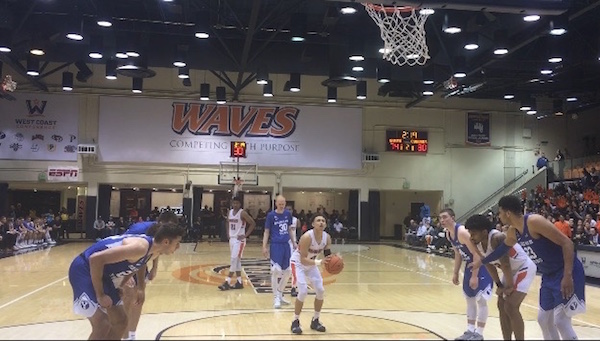
One may spot the average overcommitted Pepperdine student as he or she strolls through campus with baggy eyes, wearing sweatpants and downing an extensive amount of coffee.
Pepperdine fosters students prone to serious cases of fatigue and anxiety as students overcommit to extracurricular activities in addition to general course work.
With more than 125 students-led organizations and clubs, Pepperdine has no shortage of opportunities for students to get involved.
A fall 2012 poll of 50 students found that 61 percent were involved in one to two activities, 27 percent were involved in three or four, and 9 percent were involved in four or more extracurriculars.
More than three-fourths of students surveyed said extracurriculars added stress to their lives and had negative impacts on their health, due to lack of sleep and poor eating habits from a lack of time.
Freshmen at Pepperdine are especially prone to overcommitment, in part because the priority deadline for the International Program application is due within the first two months of the school year.
There are six international programs available and students who apply must commit to either a year abroad, a semester abroad or a summer term abroad.
Residential adviser positions and spiritual life adviser positions are also available to students on the Malibu campus.
Students holding these RA and SLA positions act as counselors with Pepperdine’s Housing and Residential Life in addition to maintaining their academic and social lives, often prompting an increased level of stress.
As a major force on campus, the 12 Panhellenic sororities and fraternities at Pepperdine occupy the schedules of hundreds of students.
The Greek system hosts dozens of fundraising events throughout both the fall and spring semesters, which raise money for various philanthropies unique to each fraternity and sorority.
In addition to hosting various philanthropic events, sororities and fraternities include administrative boards occupied by student members of the fraternity.
Lack of sleep, maintaining an unhealthy diet and prioritizing incorrectly are each side effects seen in students who tend to overcommit themselves, said Nivla Fitzpatrick, a licensed psychologist and associate director of the Pepperdine Counseling Center.
Most students tend to seek guidance once they reach their breaking points. Students will request to meet with a staff member in the Counseling Center once they reach their peak level of stress or anxiety, Fitzpatrick said.
“We often see people in distress and unfortunately, it is not uncommon,” Fitzpatrick said.
Students often request appointments in the Pepperdine Counseling Center without realizing the root causes of their anxiety and stress levels, Fitzpatrick said.
Fitzpatrick believes it is an American cultural standard to “feel the compulsion to do more, to accomplish more and to aspire to be more.”
“Students don’t exactly spell out why they think they’re stressed,” Fitzpatrick said. “It takes our staff some serious digging to reveal to the students that they are stressed due to their overcommitment.
“Students need to plan their time wisely and construct proper energy placement as their days become busier,” Fitzpatrick added.
Fitzpatrick said students’ course loads, in combination with extracurricular activities, are a major factor in the increasing stress levels of college students everywhere.
“The addition of extracurricular and social activities to a student’s general course load affect stress levels dramatically,” Fitzpatrick said. “It’s the overcommitment to these activities that pushes students too far, to a state of anxiety and helplessness.”
Fitzpatrick encourages students to reevaluate their priorities and understand their personal health needs before committing to any other activities.
Senior Jolene de los Santos is an active member of Kappa Alpha Theta and serves as the sorority’s chief financial officer. In addition to her involvement in Greek life, de los Santos is also a student worker in the Seaver College mail room and is the finance chair and a ballet choreographer for Dance in Flight.
De Los Santos said she expects to feel stressed as she continues to commit to activities, but is never “fully prepared” when the anxiety hits.
“The stress builds gradually, but there are days when I truly realize how I have spread myself extremely thin,” de los Santos said. “I get overwhelmed with running around nonstop — from a committee meeting, to Convo, to an executive board meeting, to work, to class, to a group project meeting, then to a rehearsal — all in one day.”
Pepperdine junior Brianna Rhodes periodically writes for The Graphic and is a member of the Green Team and Latino Student Association.
“I do feel stressed,” Rhodes said. “I enjoy being involved in a lot of activities; however, I feel that, because I have over-committed myself, something always suffers. Sometimes I don’t sleep so I can keep up with school.”
Rhodes also works for Sodexo, the food management company at Pepperdine, as a cashier at Nature’s Edge.
On-campus employment, which in some cases is not optional for students receiving federal work study, consumes additional time from students’ schedules as they work their way through their time at Pepperdine.
“When I feel out of control because I am so overwhelmed, I call my mom and vent and as a last resort I give up something, but I try to prioritize and organize myself so that this doesn’t happen,” Rhodes said.
“I think Pepperdine as an institution has provided me with many networking opportunities which has helped me feel better prepared for the ‘real world,’” Rhodes continued. “However, Pepperdine fosters a community that I feel shelters people.”
In addition to on-campus jobs, students are encouraged to obtain internships in the fields of their majors.
Rhodes currently works at Gold Circle Films, where she spends about 15 hours each week as an unpaid intern.
“Oftentimes I miss out on fun activities that are planned with the various groups because I have other commitments,” Rhodes said. “My biggest struggle is trying to figure out a good balance between social activities and my career.”
“(Students) would rather be involved in 10 activities instead of four just to lengthen their resumes,” Seaver College Dean Rick Marrs aid.
Anxiety over an inadequate resume is the primary motivation for students to become over-committed, Marrs said.
Those involved in athletics, theater, fine arts, service projects and Greek life are affected both negatively and positively by overcommitment, Marrs said.
To reduce the negative effects of becoming over-involved, students must “pick a passion, find meaning in something and stick to that activity,” Marrs said.
Mardie Agnew completed this story in Dr. Christina Littlefield’s fall 2012 Jour 241 class.



